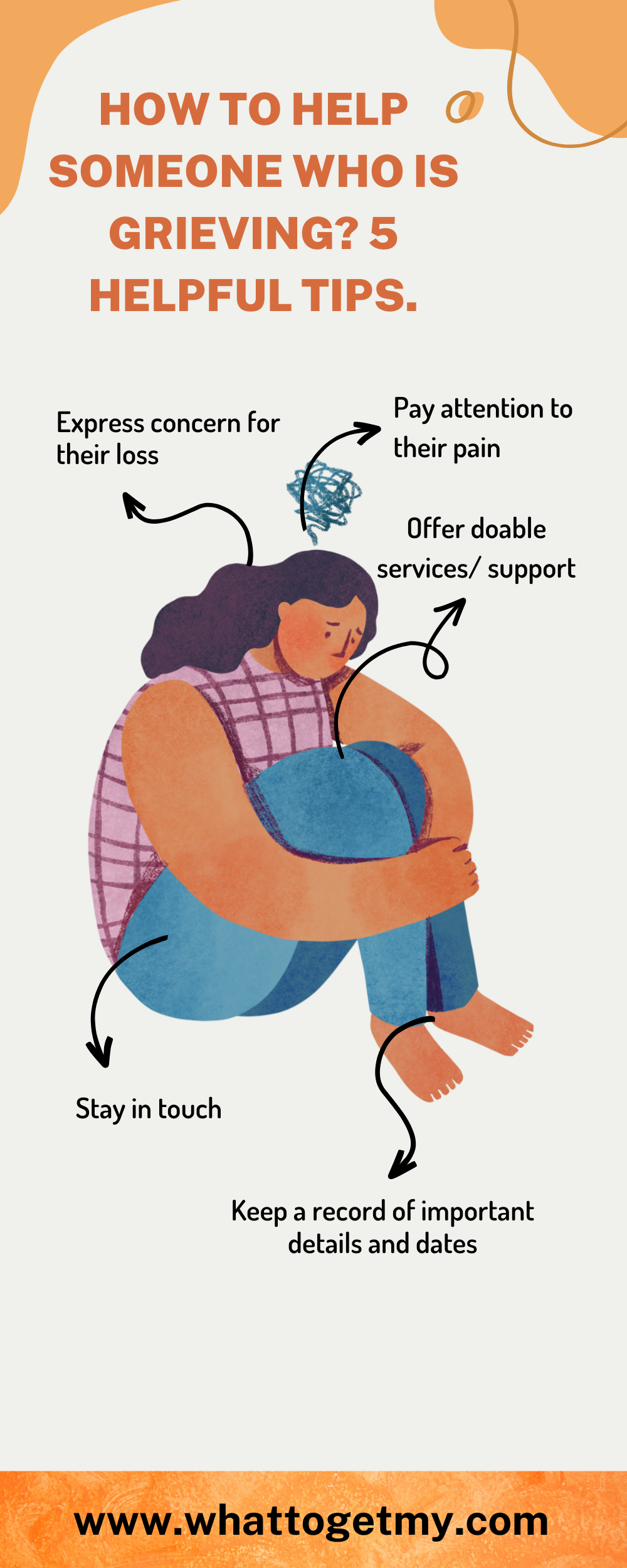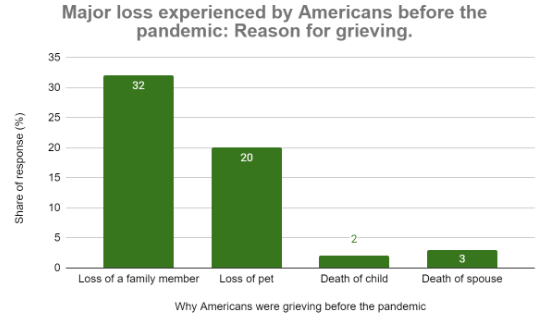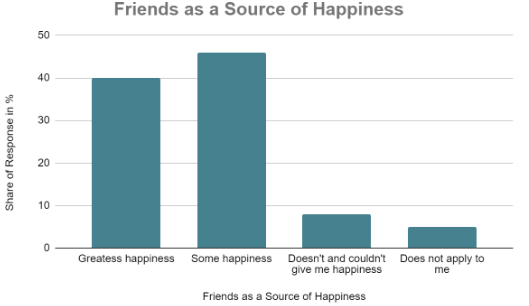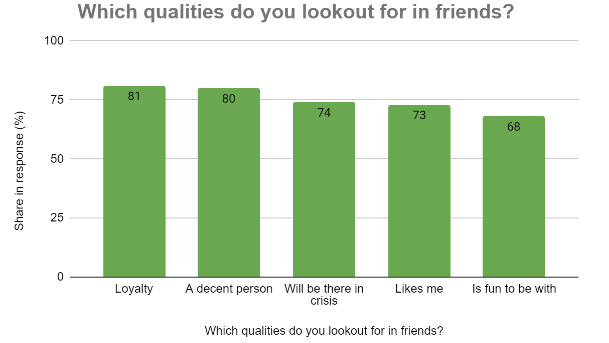How to help someone who is grieving? 5 helpful tips.
WhatToGetMy Instructional Article
- Knowing how to help someone who is grieving is a critical skill everyone should have. This article is packed with helpful ways to support a grieving person experiencing any kind of loss.

“Grief is like the ocean; it comes in waves ebbing and flowing. Sometimes the water is calm, and sometimes it is overwhelming. All we do is learn to swim.”
- Vicki Harrison.
Fun fact: A study done before the pandemic found that 57% of Americans experienced a major loss. They were either grieving the death of a family member, spouse, child, pet, or marriage. Source: eterneva.com.

Grief is a natural response to the feeling of loss or separation. It is an inevitable part of life. We will all be tasked with the duty of showing support to someone who is grieving at a point in our lives. Knowing how to help someone grieving is a critical skill everyone should have.
To support a person who is grieving, we must first understand and accept these two truths about grieving;
We grieve for different reasons.
Grieving is not limited to losing a loved one. We grieve when we’ve lost valuable opportunities, connections, money, marriage, pets, health, sentimental items, etcetera.
Just because you do not value why a person is grieving does not mean that the grief is unimportant.
We grieve differently.
People grieving experience a strong wave of emotions that could manifest in different ways; crying, extreme silence, self-harm indulgence, etcetera. You’ll find more ways people react to grief below.
Just because you are used to people crying when expressing grief does not mean that everyone will respond to grief the same manner.
Why and how people grieve may seem strange sometimes. It is important to keep an open mind when intending to show support to a friend, neighbor, colleague, or family member who is grieving.
Five helpful guides to supporting a grieving person?
Express concern for their loss.
The first and most common way people support someone who is grieving is by showing concern for their loss. You must acknowledge that the loss happened and that your friend is looking for ways to deal with the situation.
Imagine you lose something or someone dear to you, and everyone ignores you and the loss and moves on like it never happened; how would you feel?
A lack of concern for loss gives the impression that the thing or person that was lost is of no value, which is heartbreaking to the bereaved.
Showing concern for a person’s loss tells them that you;
- Acknowledge the deceased existence and lack of it.
- Recognize the value of life.
- Understand the finality of death. The bereaved will never see their loved one/s in this world again.
- Wish them well because their (bereaved) well-being is important to you.
How you show concern is important. People are often lost for ideas about what to give or say to someone grieving. Worry not.
In case you are looking for what to say to someone who is grieving, we have a list of ideas you could run with. See;
- what to say instead of sorry for your loss,
- what to say when someone is ill,
- what to say to someone who lost their grandmother.
- What to write in a sympathy card for loss of mother.
- What to write in a sympathy card for the loss of a son.
If you are looking for a list of ideas on what to give to someone to someone who is grieving, here are a couple;
- Sentimental gifts for a grieving widow.
- Sympathy gift for loss of a father.
- Sympathy gift for loss of grandmother.
- Sympathy gift for the loss of grandfather.
Pay attention to their pain and how they’ve chosen to express it, and don’t judge them for it.
One of the reasons why people get confused or discouraged trying to help someone grieving is that they cannot recognize how different people express or deal with painful events. Some of the ways people react to grieving are;
- Sobbing and sorrowfulness.
- Deep sadness; depression.
- Irritation and anger.
- Physical ache, body pain, and illness.
- Deep frustration and restlessness.
- Isolation, social withdrawal, break in communication.
- Lack of appetite.
- Suicidal expression; threat to safety.
- Expression of guilt and reproach.
- Blaming and complaining.
- Fatigue, exhaustion.
- Restlessness, sleep deprivation.
- Symptoms of anxiety like panic, shortness of breath, tightness of the throat, etcetera.
Recognizing how people express their grief will help you;
- Be more sensitive and patient with them,
- Respond appropriately / be more helpful,
- Inform relevant people for additional support (if and when needed).
Offer doable services/ support.
The loss of something or someone comes with many stressors that could overwhelm the bereaved. Often, those who mourn try not to ask for help for fear of rejection or overburdening other people with their problems. Taking up chores or rending other helpful services is one of the kindest ways to help someone who is grieving.
Sadly, many intending helpers make the mistake of offering to help and failing to do so. Note that making unrealistic promises adds to the stress of the bereaved. For example, if you offer to cater food and don’t, the grieving will be forced to make alternative plans on short notice and, sometimes, with limited resources.
People commonly make unrealistic promises by saying, “if there is anything you need, don’t fail to let me know.” Are you sure you can give anything to someone mourning a loss? Never make frivolous promises to someone who is grieving. Rather, make specific promises and keep to them.
Stay in touch.
It is common for people to show massive concern for someone grieving at the initial stage of loss. Sadly, their care show fades out as quickly as it comes, and the grieving person is left to carry their cross alone.
Stay in touch with your friend, acquaintance, or loved ones who are grieving. Do not assume another person will keep them company and help them out. Sometimes nobody does. A grieving person can never have enough support or love. Your presence, call, or text is as equally valuable as the next person you think will show them support.
Did you know that friends can positively impact their friends’ overall feeling of happiness?
Even if you’re not a friend, being present is one way to give hope. Hope is a great remedy for difficult times. Keep checking in on people grieving.

Source: Statista.
Also check out qualities people look out for in friends below.

Source: Statista.
Keep a record of important details and dates.
One of the kindest things to do for someone who experienced a major loss is to show them support during dates that remind them of the painful loss they experienced. Grief doesn’t always fade in days, weeks, or months. Grief could linger for years. Also, remembering details of
What are the 7 stages of grief after a death?
According to Elisabeth Kubler-Ross, there are 5 main stages of grief;
Denial.
The first stage of grief is disbelief that the event happened or can happen to the victim. In this stage, the victim is in a state of shock, and denial helps them numb/ lessen the pain of loss until the grieving person can completely accept that the loss has happened. It is said that this first stage is nature’s way of helping a grieving person cope and survive a hurtful situation.
Anger.
Anger is the second important stage of grieving that leads someone who is grieving closer to healing. In this second stage, the person grieving is completely aware of what has happened but does not agree with it. The victim feels intense pain and a wide range of intense emotions. The anger they feel could lead to something constructive or destructive. The grieving person could either build or break bridges due to the anger they feel. The anger they feel could also be transferred to other things or people. The person grieving could blame themselves for the situation. Anger is said to be an expression of intense love for what was lost.
Bargaining.
When someone who is grieving gets to the point of wishing for a better outcome and asking to do anything for it, they have gotten to the bargaining stage. When someone who is grieving gets to the bargaining stage, it is common to hear things like, “it happened because God is about to give me something better, right?” “God, if I am not infected, I’ll never have unprotected sex again”, “if he comes back to me, I will be nicer, I will do better.” etcetera.
Depression.
Depression sets in when the person grieving realize that they cannot do anything about their situation and is struggling to come to terms with it. They know that their chances of getting what they bargained for are slim or never happen. The person who is grieving is overwhelmed with the feeling of helplessness, and they could express it in a range of ways such as; excessive eating or substance abuse, risky sexual encounters, deprivation of meals or healthy living, self-isolation, etcetera.
Acceptance.
In this final stage of grieving, the person grieving is no longer fighting the reality of what happened. They understand their situations very much whether they agree with it or not. The acceptance stage propels them for what’s next.
Frequently Asked Questions.
Should you leave a grieving person alone?
If the person is not a danger to themselves, you should respect their wishes. It is common for people to want to be alone when they’re grieving. A plea for seclusion should not be taken as an attempt to chase friends away. It hurts to stay away from the person you want to be there for because they want to be alone. It might make you think that you’re not valued. But you must allow people to seek the best way to heal themselves if you truly care for them.
Someone who is grieving still needs people even when they ask for time off. The kindest thing to do for your friends is to be present when they want to be alone. Send texts or care packages to them when they are not ready for company. Do not detach from someone who is grieving.
How can I help someone who is grieving?
- Express concern for their loss
- Pay attention to their pain and how they’ve chosen to express it, and don’t judge them.
- Offer doable services.
- Stay in touch
- Take note of details and dates.
What are five ways to support a grieving person?
- Drop off food items or care packages.
- Volunteer to run errands like grocery shopping, school runs, etcetera.
- Make financial contributions to them.
- Take them out for dinners, fun activities, and trips.
- Look out for better opportunities for them.
- Introduce them to people/ help them gain useful connections.
Conclusion.
Grieving is like a revolving globe. Sometimes it’s them; sometimes, it’s us. Therefore we should all learn how to comfort and support people through difficult times.
19 MINUTES
ESTIMATED TIME DESIGNING AND UPLOADING THIS ARTICLE
12 HOURS 16 MINUTES
ESTIMATED TIME RESEARCHING AND WRITING THIS ARTICLE
You Might Also Like
Where to Stay in Budapest for First-Timers: Your Neighborhood Guide
Where to Stay in Budapest for First-Timers: Your Neighborhood Guide Think of District 5 as the popular kid everyone wants to hang out with – and for good reason! It’s basically Budapest’s living room, with the fancy Parliament Building on one side and the gorgeous Chain Bridge on the other. I stayed there last summer

Wedding Anniversary Celebration Ideas With Friends
Wedding Anniversary Celebration Ideas With Friends WhatToGetMy Instructional Article In the first couple of years of marriage, most couples enjoy celebrating their wedding anniversary alone. They are still in the “honeymoon phase” and enjoy spending their special day with each other while being romantic and

When we think about what thank you gifts to get someone or a group of people, we automatically think of food-related gifts because it is the easiest gift to get. It is a gift that would please anyone, because who doesn’t love chocolates, cookies or

Characteristics of a Selfish Husband.
Characteristics of a Selfish Husband. WhatToGetMy Instructional Article Selfish men in marriages are a disastrous recipe for any marriage. They consistently display selfish behavior in the marriage that only causes their wives untold pain and hurt. And in this article, we take a look at

7 Crucial Signs Your Boss Trusts You
7 Crucial Signs Your Boss Trusts You WhatToGetMy Instructional Article The foundation of every effective work relationship is built on trust. At the root of trust is the question “how dependable is this person?”. For many bosses, the questions they ask often are; 1) Will

25 Brain Themed Gifts For Neurologists and Neuroscientists
Neurologists, Neuroscientists, and Neuropsychologists (collectively called “Brain Practitioners” in this article) all work with the human brain and different aspects of the brain. Our selection of 25 Brain Themed Gifts for Neurologists would be suitable gifts for any of these Brain Practitioners. Neurologists, Neuroscientists, and

22 Mobility Assistance Gift Ideas For Limited Mobility
In this article, you will find general gifts for people with mobility issues that are suitable for both children and adults (including seniors), and then specific gifts for the following categories: gifts for seniors with limited mobility, gifts for low mobility travelers, and great gifts

Signs Someone Is Competing with You
Signs Someone Is Competing with You WhatToGetMy Instructional Article In life, we consider achieving our goals as fundamental and vital to our growth, but if you notice that someone is showing you a different kind of attitude or treating you like an enemy, you may

What to do with annoying husband; 7 helpful tips.
What to do with annoying husband; 7 helpful tips. WhatToGetMy Instructional Article If his excesses are overbearing and you’re wondering what to do with your annoying husband, keep reading to find interesting ideas on how to stop an annoying husband from driving you nuts. “Your

17 Great Knitting Themed Gifts For The Knitter Who Has Everything
Knitting gadgets, tools, and accessories are knitting themed gifts that would always be happily received by a knitter, including the knitter that has everything. The selection of Gifts for the Knitter Who Has Everything are gifts that can be given for any occasion, and also


